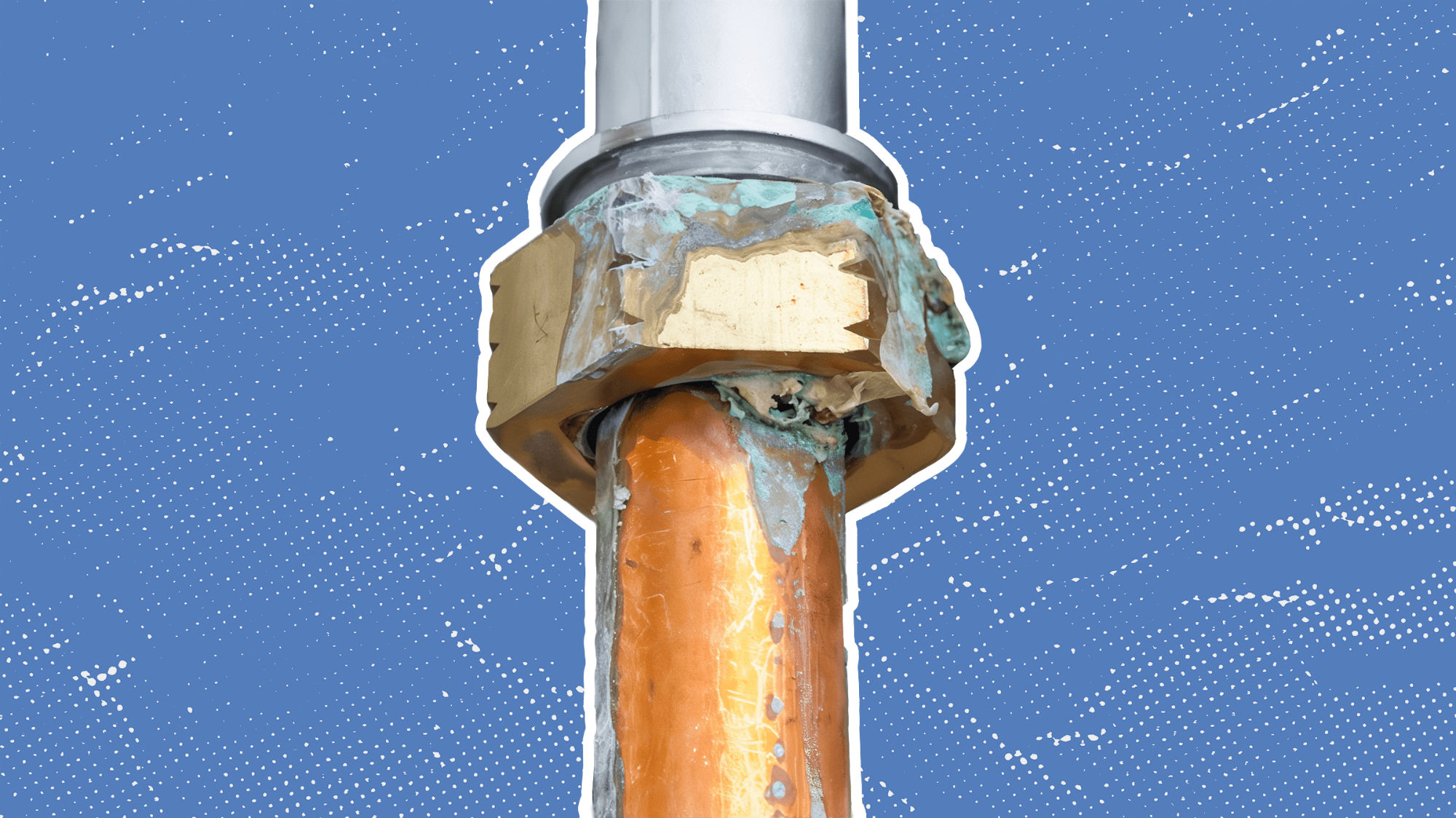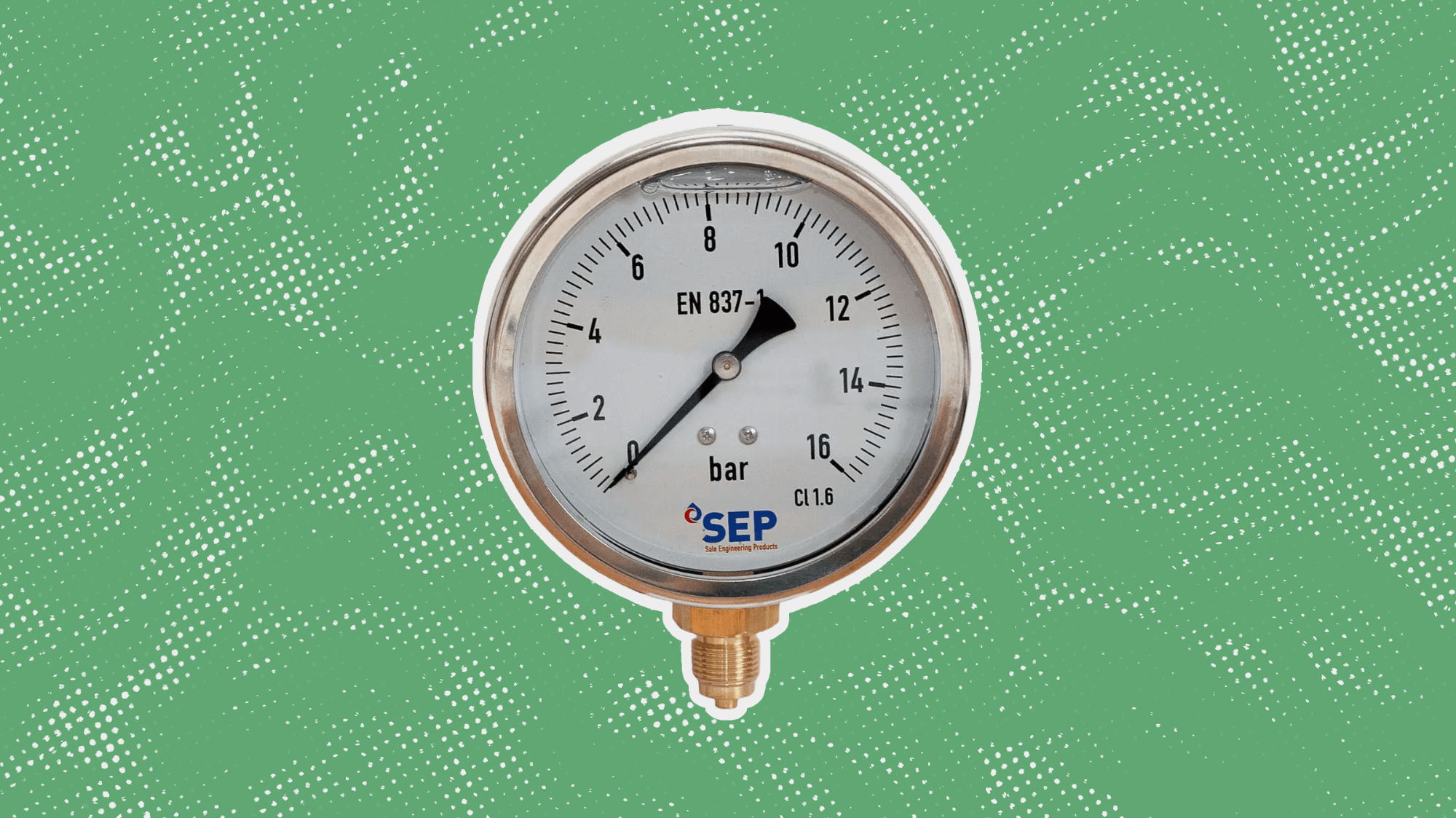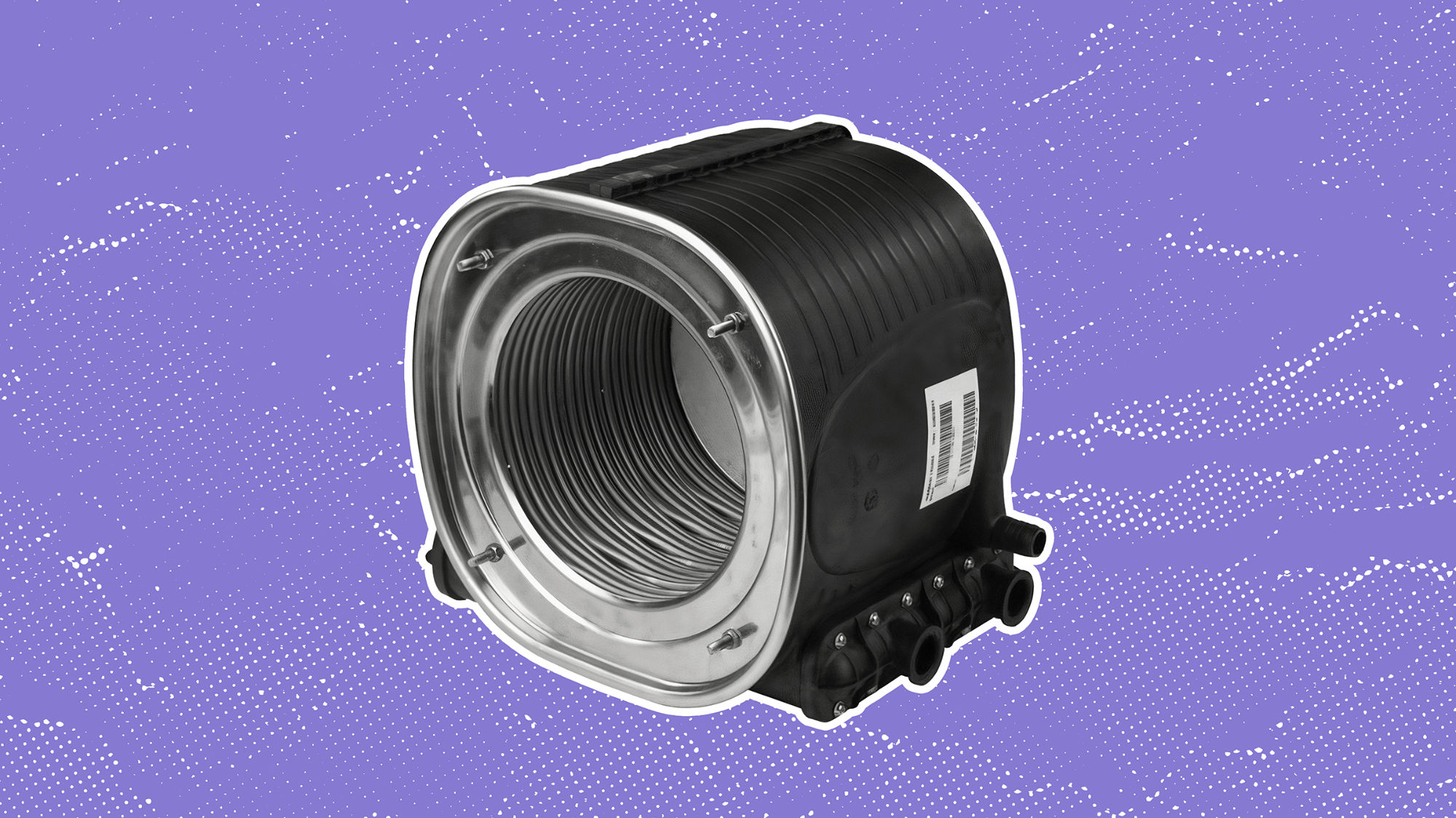Boilers are capable of leaking more than Julian Assange. Get clued up.
- Why is my boiler leaking water?
- “Leaks by location” quick diagnosis:
- [1] Water leaking from underneath? Poorly installed or corroded pipework
- [3] Corrosion to your system and general system wear
- [4] Leaky, or faulty heat exchanger
- [5] Leaks from seals on internal parts
- What should I do if my boiler is leaking water?
- Is a leaking boiler dangerous?
- How to stop (or help prevent) future boiler leaks
What to do right now (safe first steps):
Catch the leak: put a bucket/bowl under the drip and wipe up any water.
If water is near electrics: turn the boiler off at the fused spur (and keep the area dry).
Check the pressure gauge: many systems sit around ~1 bar when cold (often within the green zone).
Check the filling loop is fully closed (a common cause of rising pressure and leaks).
If the leak is steady, internal, or you’re unsure: book a Gas Safe engineer (don’t open the boiler casing).
Is a boiler leaking water bad?
If you're reading this article, you've probably just discovered a puddle of water below your boiler, it's been leaking for a while and you've finally decided to stop ignoring it, or you’re bored beyond comprehension.
Depending on what's leaking, it could be easy to fix or something a little more severe which will require an engineer's attention.
The first thing you need to know is - a leaking boiler is not good. It’s a precursor to a cold house, cold water, and a cold shoulder from your spouse because you haven’t fixed the problem yet.
🔑 Key points (quick summary):
Yes - it’s bad and should be checked quickly. Leaks often worsen and can lead to breakdowns or water damage.
Find the source:
Underneath/pipe joints: loose joint or corroded pipework.
Outside discharge pipe: often high pressure / PRV.
From inside the casing: likely an internal part (seal/pump/heat exchanger) → engineer.
Do now: bucket/bowl + wipe up, check pressure gauge (~1 bar cold / green zone), make sure filling loop is fully closed.
Call a Gas Safe engineer if the leak is steady, internal, pressure keeps rising, or you’re unsure.
Repair vs replace: older boilers (often 10+ years) or major internal faults can make replacement better value.
Prevent: annual service + magnetic filter / system clean to reduce sludge/corrosion.
You can find out what boiler you need along with the costs using our quick questionnaire (it only takes 60 seconds).
Why is my boiler leaking water?
Before addressing any issues with your boiler, it’s crucial to determine the source of the leak, which can sometimes be challenging.
Start by locating where the water is coming from, as this will help you diagnose the problem more effectively.
“Leaks by location” section before your numbered causes
Place this just before: “Below, we’ve listed some of the main causes…”
“Leaks by location” quick diagnosis:
Boiler leaking water: quick diagnosis by leak location
Leaking from underneath (pipework/joints): often a loose joint, new-install snag, or corroded pipework.
Dripping from an outside copper pipe: can be the pressure relief valve (PRV) discharging due to high pressure.
Water from inside the boiler casing: often an internal component (seal, pump, heat exchanger) → Gas Safe engineer.
Pressure keeps rising / keeps needing topping up: can point to filling loop issues, PRV problems, or internal faults.
Below, we’ve listed some of the main causes of boiler leaks:
Common boiler leak causes (and what it usually means)
Cause | What you’ll notice | Typical fix | Typical cost (UK, estimates) |
Loose joint / pipework leak | Drips under boiler, wet pipe joints | Engineer reseals/adjusts joints | ~£100–£250 |
High pressure / PRV discharge | Pressure gauge high, drip from outside | Close filling loop, bleed rads, engineer checks PRV/vessel | £0 DIY → ~£150–£400 |
Corrosion / wear | Rust staining, frequent leaks, old system | Component replacement or boiler replacement | ~£150–£800+ |
Heat exchanger leak | Often internal leak; engineer diagnosis | Usually not cost-effective to repair | Often points to replacement |
Internal seals/pump leak | Leak inside casing, intermittent dripping | Engineer replaces seals/parts | ~£150–£500+ |
Costs vary by location, boiler type, and access - these are just typical ballparks.
[1] Water leaking from underneath? Poorly installed or corroded pipework
The pipes immediately underneath your boiler are going to be your number one culprit for the leaking boiler.

The most common cause of this pipework causing a boiler leak is corrosion of the pipes - not quite the same as the corruption of the pipes, which is what happens when you need hot water for some money laundering.
Over time, the water, combined with the metallic debris within the system will naturally corrode the copper piping eventually leading to small gaps which water is escaping from - leaking.
And if you're just curious to see how much a new boiler will cost complete this quick questionnaire to find out for free.
If, on the other hand, your boiler is particularly new – perhaps even just installed – then clearly this isn’t going to be the case and it is more than likely some joints in the new boiler pipework that haven’t quite been fitted correctly.
Don’t panic – you haven’t necessarily had a cowboy installation undertaken, small water leaks are remarkably common in new boiler installations and it can be quite difficult for installers to spot any and all potential leaks at the time the boiler was installed. Once there is a puddle, it’s a lot easier to spot the leaks.
Any conscientious boiler installer will return to check and correct the work for you and fix those leaks.
How to check for a water leak underneath your boiler:
It sounds kind of obvious, but, look directly underneath your boiler for any signs of leaking. If it’s a small leak, you might need to feel around the joints of the pipework for wetness.
How to fix a water leak underneath your boiler:
If you’re certain that the pipework underneath your boiler is leaking, you’re going to need a gas engineer to fix it. It’s important you don’t undertake any boiler work yourself.
You can, however, ensure the leak is contained – by placing a bowl or bucket underneath the boiler or even carefully wrapping the leaking pipes in some cloth.
It may also be a good idea to start researching how much a new boiler may cost.
Is your boiler over 10 years old?
Corrosion of the pipework under the boiler is the first sign your boiler is moving on to a better place. A gas-safe engineer can take it behind the barn for you, so you can tell your kids it went to boiler heaven.
Need help? Here are our quick help guides:
[2] High Boiler Pressure
Fun (and untrue) fact: few people know Queen and David Bowie were singing about boilers in their 1981 hit Under Pressure. But chances are you’ve probably heard the boiler and pressure mentioned a lot and never quite understood what it means.

Boilers under too much pressure (too much water) break down and cry. If the boiler's pressure is too high, the PRV (pressure release valve) will discharge the excess water, or, parts will fail internally causing the leak.
How to check for pressure issues:
Any self-respecting boiler will have a pressure gauge on the front – the one that looks like a low-end speedometer for snails.
For combi boilers and system boilers, the pressure gauge on your boiler should be around 1 bar and within the green markings.
Unsurprisingly, anything above that green bar would indicate an over-pressurised boiler. Like an evening out, too many bars are a bad thing with boilers.
🎥 Watch our Youtube video on how to check and adjust your boilers pressure in simple steps below:
How to fix pressure issues:
Reducing the pressure of your boiler can be done at home by ‘bleeding’ the system. This isn’t as sinister as it sounds and requires no human or animal sacrifice.
But first – and particularly if you have recently topped up your boiler pressure – you should check that the filling loop tap underneath your boiler is firmly closed.
You may also be interested in our guide to DIY boiler checks you can do before you call a Gas Safe Engineer.
As pictured above, this will be a silver flexi-pipe with either one or two black taps.
Ensure these taps are firmly closed – closed should be pushed all the way left or clockwise.
But if you’re unsure – quickly and slightly pull the other way to briefly notice the pressure increase before returning and firmly closing.
Bleeding radiators should be your next step...
This is somewhat more of a pain and will require some basic tools and a relatively low level of confidence, approximately the amount conjured up by Gareth Southgate during his Euro ’96 semi-final penalty miss against Germany.
You'll need to use a bleed key and loosen the nut on the end of the radiator. As you turn it, water from your system will come out. Don’t worry, in spite of the name, it’s not hurting your boiler.
Is the boiler still leaking? We can fit you a brand new boiler as quickly as tomorrow - Get a quote online, today.
Is your radiator leaking? It may be a lockshield valve leaking.
[3] Corrosion to your system and general system wear
It’s true that in most cases boiler leaks are caused by corroded pipes and hot water cylinders, which become brittle and gradually degenerate. It feels harsh to bring up the comparison with people again, but you know it’s true.
If only a single component is corroded, then a Gas Safe Engineer may be able to replace it relatively cheaply, but extensive corrosion may indicate it’s time for a new boiler.
Time heals all wounds except for boilers. Time kills boilers (and causes leaks).
Extensive corrosion over a long time is a huge clue that you’re due a new boiler, although do get it checked by an engineer first in case they can still save it – just weigh up the cost of repairs and future repairs against the cost of a new boiler.
Lots of corrosion = lots of leaks.
How to check for corrosion:
Visual checks are about as far as the uninitiated in Gas Safety can go here. It’s really just a case of visually observing how monumentally knackered and rotted to the core your boiler is. If your boiler looks like James Cameron personally retrieved it from the Titanic, it’s time for a new one.
How to fix corrosion:
Again, there isn’t much you can do but prepare your bank balance here – whether it be for a costly repair or probably more suitably, a new boiler installation. Get calling a heating engineer and check out the best new boiler deals online.
Is the boiler still busted? We can fit you a brand new one as quickly tomorrow. Get a quote online, today.
[4] Leaky, or faulty heat exchanger
Unfortunately, the heat exchanger of your boiler is the most expensive component. It’s not uncommon for them to fail or crack in old boilers and particularly cheap low-quality boilers – irrespective of age.

If you bought your boiler at the farmers market, in exchange for a basket of cabbage then get ready for a broken heat exchanger.
How to check for a leaking heat exchanger:
This isn’t something you can identify yourself and you’ll have to get a qualified gas engineer to diagnose the problem (yes, they are more expensive than you are, too).
Unfortunately, once diagnosed as a broken heat exchanger, your boiler is likely terminal. It is going to cost you several hundred pounds to keep in the limbo between life and death.
How to fix a leaking heat exchanger:
Heat exchangers can be replaced by boiler engineers but likely at a cost that would be considered a false economy.
Your best option here is to get yourself a new boiler, whatever type of boiler you need. Ideally an outrageously well-priced range-topper from Viessmann with a stainless steel heat exchanger that Thor’s hammer couldn’t crack. Make sure to check our Viessmann 050 review for the full rundown.
Educate yourself silly with our article on the best combi boilers.
Is the boiler still busted? We can fit you a brand new Which? Best Buy boiler as quick as tomorrow. Get a quote online, today.
Are you curious to know which boiler brand performed worst? Find out in our report of the worst boilers.
[5] Leaks from seals on internal parts
Boilers are like humans, there are fluids running through their whole system but only in the right channels. Internal bleeding (and leaking) is bad and needs to be stopped.
Sometimes the seals on parts and joints inside your boiler can decay over time or if your boiler is over-pressured, once the seals fail, water leaks out of them at a sometimes surprisingly rapid rate.
How to check for leaks on seals:
You can check for leaks in seals at home if you’re comfortable removing the cover of the boiler and having a look around.
If you aren’t a gas-safe engineer (hopefully not if you’re reading this) then you should treat your boiler like salmon on a fresh fish counter and look – but don’t touch (and no licking, either).
Greek mythology has it that when Pandora opened up her boiler to check the internal seals, all of the evils flew out over the Earth. In the end, only hope remained. Hope of a new boiler.
How to fix leaks on seals:
Outside of attaining a gas-safe qualification and becoming a fully-fledged heating engineer, you should leave this one to the professionals - just like driving a Formula 1 car through the streets of Monaco.
Small sealant issues can be solved relatively cheaply however more substantial seal issues caused by corrosion over time might well leave you looking for a new boiler.
Is the boiler repair cost looking too steep? Get a new boiler installed by us, tomorrow. Get a quote online, today.
What should I do if my boiler is leaking water?
Complete the aforementioned visual checks
Minimizing leaking/collect water drops in a bowl, bucket or your mouth if thirsty
Correct pressure if possible
Appoint a heating engineer
Prepare for bad news and research prices for a new boiler
Is a leaking boiler dangerous?
Possibly, but highly unlikely.
It’s largely an inconvenience and your boiler's way of letting you know that its time in this world has come to an end. A leak is no laughing matter.
An old boiler does, however, pose a large and relentless danger to your bank account. Do the maths on the repair work and likelihood and probable cost of future breakdowns vs. a new boiler, covered under a 10-year warranty - a new boiler is probably going to be cheaper in the long run. This is especially true if your boiler is particularly old.
It may also be a good idea to start researching how much a new boiler may cost you.
How to fix a boiler leak
It's usually best to leave leak repair to the professionals, especially if you suspect an issue with an internal component. However, in some cases and if you feel confident, you can do a quick DIY fix.
If you see water leaking from a pipe joint, dry it off using a cloth and attempt to tighten it. Sometimes, a leak may be the result of a loose joint, so if you suspect this is the case, it's worth a try.
The worst-case scenario is that you accidentally pull a pipe loose and miraculously injure yourself, but that risk is extremely small.
Should you use a boiler leak sealant?
If the leak is a pinhole leak, then you may be able to seal it up by using a special additive you add to your central heating system that will automatically seal the holes as they circulate through the system.
However, these are not always straightforward to add to your system and in the majority of cases will not offer a solution.
Should you repair or replace your boiler? It's also probably a good idea to research the cost of a new boiler.
How to stop (or help prevent) future boiler leaks
🔑 Key prevention checklist:
Service yearly (often required to keep your boiler warranty valid).
Keep the system clean (chemical flush / powerflush + inhibitor where needed).
Fit a magnetic filter to capture sludge and protect internal components.
1) Book an annual boiler service
Getting your boiler serviced annually is one of the best ways to prevent leaks. It helps catch minor issues (worn seals, early corrosion, pressure problems) before they turn into major repairs - and it’s almost always a requirement of your boiler manufacturer’s warranty, and without it your warranty may be invalid.
2) Keep the system clean (flushes + inhibitor)
It’s also worth looking into system flushes (chemical flushes) to cleanse your heating system. Over time, sludge and metallic debris can cause corrosion, blockages and component wear - all of which increase the risk of leaks.
If your system is older or heavily sludged, an engineer may recommend a powerflush (a deeper clean).
3) Fit a magnetic boiler filter (especially on a new installation)
Heatable include a chemical flush & magnetic filter as standard with every installation - included in the price. It borders on financial insanity.
Make sure any new boiler installation you purchase is fitted with a magnetic boiler filter.
These filters collect metallic debris from your heating system, helping to prolong boiler life, prevent blockages and minimise the risk of the boiler leaking.
Don’t forget to check out our list of the best boiler brands to make sure you avoid a dud.
4) Helpful guides
Learn all about combi boilers in our what is a combi boiler guide - and if you’re considering having a new boiler installed in a new location, our cost of moving a boiler guide will be helpful.
Common leaking boilers (with error codes)
Worcester Bosch boiler leaking water:
Likely error codes: A1, E9, CE207, HO7
*error codes applicable to Worcester CDi Class, Worcester CDi Highflow, Worcester CDi Compact, Worcester Greenstar 25i, Worcester Greenstar 30i & all Worcester regular & Worcester system boilers.
Vaillant boiler leaking water:
Likely error codes: F.22, F.24, F.13, F.73, S.41, S.53
*error codes applicable to Vaillant EcoMax Pro, Vaillant EcoTEC Pro, Vaillant EcoTEC Plus
Ideal boiler leaking water:
Likely error codes: F1, L1, FD
*error codes applicable to Ideal Logic, Ideal Logic Plus, Ideal Mini, Ideal Vogue, Ideal Independent, Ideal Isar
Baxi boiler leaking water
Likely error codes: 117, 118, 125, E78, H.02 – 06
Is your boiler making a lot of noise? Find out why in our noisy boiler guide.
Boiler Leaking Water Conclusion
There is no need to sound the alarms and light the beacons of distress to alert the elders of the boiler world of a leak.
But it does need investigating.
If you happen to be growing an array of herbs and small vegetables directly under your boiler, a small and manageable leak may serve you well
If it’s a small leak caused by a loose seal then it can likely be repaired easily and most importantly, cheaply.
Larger leaks in older boilers, particularly boilers weathered by the sands of time are more of a handful and could lure you into an endless pit of wasted money. And if you have an immersion heater, their poor running costs make upgrading to a combi well worth it in the long run.
In this instance, check out our selection of combi boilers with solid, reliable internal parts and a decade-long parts & labour warranty – that covers boiler leaks?
Wondering how much a boiler replacement may cost? Check our new boiler costs guide and see our guide to boilers on finance if you want to spread the costs and pay monthly.
Next Steps For Your New Boiler Journey:
When planning to install a new boiler for your home, there are several important factors to consider. Make sure to refer to the following guides to help you make informed decisions:
To dive deeper into these topics, head over to our advice section, or check out our YouTube channel to learn more.
Looking for a great deal on a new boiler?
If you’re aiming to get the best deal on a new boiler, consider getting a quote from us, here’s why:
Gas Safe installation within 24 hours.
Thousands of satisfied customers with an average score of 4.9 on Trustpilot, surpassing the market leader.
Which? Trusted Trader: Heatable is proudly recognised as a Which? Trusted Trader.
Price match guarantee: We will match any like-for-like cheaper quote.
Flexible payment options, including interest-free finance*.
Up to 12-year guarantee on selected boilers.
Fixed price guarantee: No hidden costs.
Save your quote and decide later.
Get an instant fixed price on a new boiler, here.
To learn more about boilers, visit our advice section, check out our YouTube channel, or read customer testimonials here.
Heat Happy.







